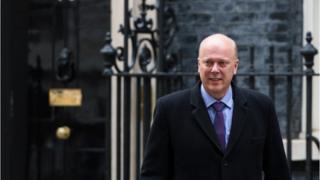Grayling defends no-deal Brexit ferry contract

Image copyright
Getty Images
Transport Secretary Chris Grayling has defended the government’s choice of a UK company with no ships as one of the providers of extra ferry services in the event of a no-deal Brexit.
Mr Grayling told the BBC he would make no apologies for “supporting a new British business”.
The firm, Seaborne Freight, won a £13.8m contract to run a freight service between Ramsgate and Ostend.
But a BBC investigation discovered it had never run a ferry service before.
Mr Grayling told the Today programme that the government had “looked very carefully” at the business.
“We have put in place a tight contract to make sure they can deliver for us,” he added.
The contract award notice, which has been published online, reveals that the tender process took place “without prior publication of a call for competition”.
It states that the limited process was due to “a situation of extreme urgency” in the run-up to the UK’s EU departure date.
The document shows that the contract received a single bid, from Seaborne Freight.
The Road Haulage Association (RHA), which represents firms bringing freight to and from UK ports, said its members were worried about how their trucks will get across the Channel.
Seaborne Freight will need to “source ferries, hire and train staff and link with relevant authorities”, according to Rod McKenzie, a managing director at the RHA.
“It looks an impossible timescale.”
Image copyright
Getty Images
Ramsgate harbour
Seaborne Freight’s chief executive, Ben Sharp, said the company planned to start operations with two ships, before increasing to four by late summer.
He declined to give details on the ships it planned to use for the service, saying the information was commercially sensitive.
Earlier, the Department for Transport confirmed that the company would only be paid if it ran “an effective service”.
As part of its preparations for a no-deal Brexit outcome, the government has highlighted the possibility of “severe congestion” at UK ports due to increased border checks.
The contract is one of three awarded to provide additional ferries between the UK and several European cities, to help ease the potential backlog.
Other contracted suppliers include France’s Brittany Ferries and Danish shipping firm DFDS.
On the likelihood of needing to bring extra services into force, Mr Grayling said that he had “had detailed discussions with the French, with French counterparts”.
“They want to keep the Channel ports operating freely and I am confident that will happen.”

